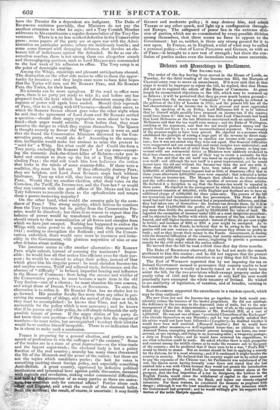France is preparing for a general election, and parties are
in search of professions to win the suffrages of " the country." Some of the trades are in a state of great depression—as the wine-trade and the import sugar-trade ; the electoral body is but a paltry fraction of the real country ; anarchy has many times threatened the life of the Monarch and the peace of the nation : but these are not the topics which candidates prefer ; the bait for votes is something exciting about foreign policy, and especially something Anti-British. A great country, oppressed by defective political institutions and tyrannical laws against public discussion, menaced with r4cide and revolution, sinking under commercial difficulties, and tiVAIrdradistraction of as many parties as there are states- men, haws Son only for external affairs ! Parties abuse each other andEnglatIti' and await the result of the electoral ballot. Such the motivea.p the result, of course, is uncertain : it may fortify Grum and moderate policy ; it may destroy him, and admit TRIERS or any other quack, and light up a conflagration through- out Europe. The safeguard of peace lies in the extreme divi- sion of parties, which are so comminuted by every possible division among themselves, that there seems no force to oppose to the Government : but so, neither, is there any strong ground for it to rest upon. In France, as in England, a trial of what may be called a personal policy—that of Louis PHILIPPE and Guizor, As with us of PEEL—is brought to a new test of strength ; but there the con- fusion of parties makes even the immediate results more uncertain.


























 Previous page
Previous page